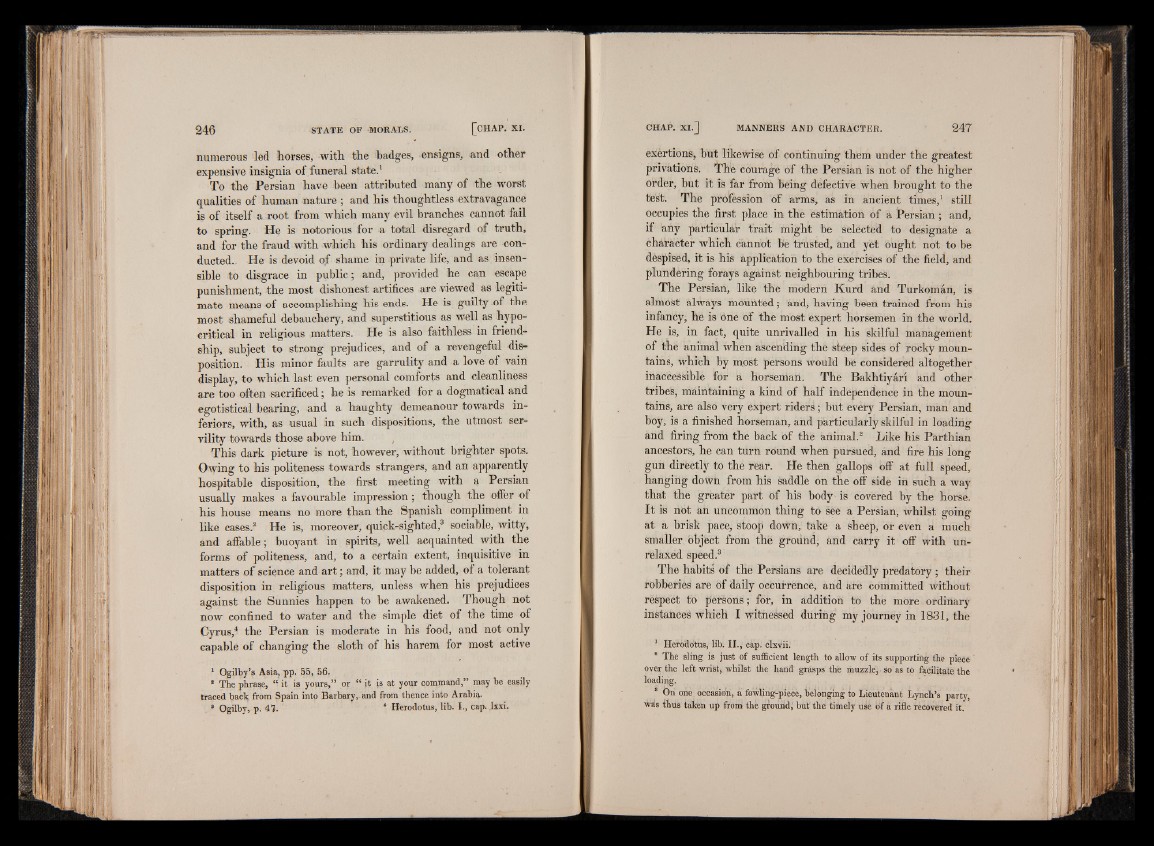
numerous led horses, with the badges, ensigns, and other
expensive insignia of funeral state.1
To the Persian have been attributed many of the worst
qualities of human nature ; and his thoughtless extravagance
is of itself a root from which many evil branches cannot fail
to spring. He is notorious for a total disregard of truth,
and for the fraud with which his ordinary dealings are conducted..
He is devoid of shame in private life, and as insensible
to disgrace in public; and, provided he can escape
punishment, the most dishonest artifices are viewed as legitimate
means of accomplishing his ends. He is guilty of the
most shameful debauchery, and superstitious as well as hypocritical
in religious matters. He is also faithless in friendship,
subject to strong prejudices, and of a revengeful disposition.
His minor faults are garrulity and a love of vain
display, to which last even personal comforts and cleanliness
are too often sacrificed ; he is remarked for a dogmatical and
egotistical bearing, and a haughty demeanour towards inferiors,
with, as usual in such dispositions, the utmost servility
towards those above him.
This dark picture is not, however, without brighter spots.
Owing to his politeness -towards strangers, and an apparently
hospitable disposition, the first meeting with a Persian
usually makes a favourable impression ; though the offer of
his house means no more than the Spanish compliment in
like cases/ He is, moreover, quick-sighted,3 sociable, witty,
and affable ; buoyant in spirits, well acquainted with the
forms of politeness, and, to a certain extent, inquisitive in
matters of science and art ; and, it may be added, of a tolerant
disposition in religious matters, unless when his prejudices
against the Sunnies happen to be awakened. Though not
now confined to water and the simple diet of the time of
Cyrus,^ the Persian is moderate in his food, and not only
capable of changing the sloth of his harem for most active
1 Ogilby’s Asia, pp. 55, 56.
* The phrase, “ it is yours,” or “ it is at your command,” may he easily
traced hack from Spain into Barhary, and from thenpe into Arabia.
3 Ogilby, p. 41. * Herodotus, lib. I., cap. jxxi.
exèrtions, but likewise of continuing them under the greatest
privations. The courage óf the Persian is not of the higher
Order, but it is far from being defective when brought to the
test. Thè profession of arms, as in ancient times,1 still
occupies the first place in the estimation of a Persian ; and,
if any particular trait might be selected to designate a
character which cannot be trusted, and yet ought not to be
despised, it is his application to the exercises of the field, and
plundering forays against neighbouring tribes.
The Persian, like the modern Kurd and Turkoman, is
almost always mounted ; and, having been trained from his
infancy, he is one of the most expert horsemen in the world.
He is, in fact, quite unrivalled in his skilful management
of thè animal when ascending the steep sides of rocky mountains,
which by most persons would bé considered altogether
inaceessiblé for a horseman. The Bakhtiyari and other
tribes, maintaining a kind of half independence in the mountains,
are also very expert riders ; but every Persian, man and
boy, is a finished horseman, and particularly skilful in loading
and firing from the back of thè animal/ Like his Parthian
ancestors, he can turn round when pursued, and fire his long
gun dirèctly to the rèar. He then gallops off at full speed,
hanging down from his saddle on the off side in such a way
that the greater part of his body is covered by the horse.
It is not an uncommon thing to see a Persian, whilst going
at a brisk pace, stoop down, take a sheep, or even a much
smaller, object from thè groiind, and carry it off with un-
rèlaxed speed.3
The habits of the Persians are decidedly predatory ; their
rbbberies are of daily occurrence, and afe committed without
respect to persons ; for, in addition to the more ordinary
instances which I witnessed during my journey in 1831, the
1 Herodotus, lib. II., cap; clxvii.
2 The sling is just of sufficient length to allow of its supporting the piece
over the left wrist, whilst the hand grasps the muzzle, so as tb facilitate the
loading.
* On one occasion, a fowling-piece, belonging to Lieutenant Lynch’s party,
wds fhus taken up from thè ground, but the timely uéè of a rifle recovered it.